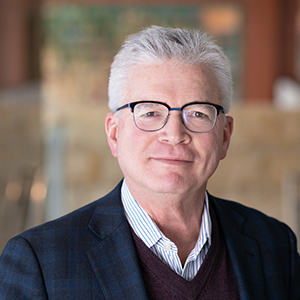It all started with his love of numbers and a desire to match it with a discipline that could have social impact. Rob Grunewald discovered that intersection in his freshman economics class at St. Olaf College in Northfield, Minn.
“I saw I could use math in a powerful framework for looking at issues facing our country and internationally,” said the veteran economist in the Federal Reserve Bank of Minneapolis’ Community Development department.
Now, 30 years removed from that introductory econ course, Grunewald’s passion for communicating the economic value of public investment in early childhood development (ECD) lives on, delivering the kind of impact he sought, as he speaks regularly about the issue across the nation.
“As long as we still have children who have not received that investment, I’ll continue to be interested in new research and policies that best reach children and their families,” he said.
That’s why Grunewald helped organize the “Innovation in Early Childhood Development and K-12 Education” conference last October. It was co-sponsored by the Bank’s Community Development department and the Opportunity & Inclusive Growth Institute.
The first day of the conference, attended by about 100 ECD scholars, policymakers, and advocates, was ostensibly to celebrate the 15th anniversary of the publication of the seminal article—“Early Childhood Development: Economic Development with a High Public Return”—that Grunewald and former Bank Senior Vice President and Director of Research Art Rolnick wrote in March 2003.
But rather than celebrate the past, the conference pivoted to the future and innovative ideas. It focused on three areas: parental involvement in ECD, the impact of early learning program quality on child outcomes, and how markets for early learning can work more efficiently.
Innovative and provocative is what Rolnick and Grunewald were when they wrote in 2003 that investments in ECD yield extraordinary public returns—as much as an inflation-adjusted 12 percent average annual rate, a far higher return than most traditional economic development programs.
And they didn’t mince words when they wrote in the first line of that article, “Early childhood development programs are rarely portrayed as economic development initiatives, and we think that is a mistake,” adding, “The return on investment from early childhood development is extraordinary, resulting in better working public schools, more educated workers, and less crime.”
Why no “on the other hand”? Why so definitive?
Grunewald said: “The data made a convincing case, so we could really rely on the research to make a statement that economic development as conventionally considered was providing a much lower return than if we had invested these resources in our children. And we wanted to catch the reader. Sometimes readers only take in the first paragraph. We wanted to encourage them to read the rest of the article.”
Among those who did, there was little pushback from neuroscientists, educators, and economists who understood that the story of developing human capital begins long before kindergarten.
But there was pushback from other constituencies.
The ECD work stemmed from another research focus and policy initiative that Rolnick had embraced: condemning the competition between states for the luring of corporations and jobs, including professional sports franchises. The return on investment in that kind of economic development was poor, he wrote, along with Minneapolis Fed colleague Melvin Burstein.
As Grunewald and Rolnick argued for a public investment in early learning for kids, they recommended the creation of a permanent endowment to support scholarships for low-income children. The idea came as they watched two Minnesota professional sports franchises—the baseball Twins and football Vikings—threaten to move to other states unless they received public funding for two new stadiums. In the end, that amounted to more than $800 million in public financing for the Twins and Vikings facilities.
But Rolnick, who is now a senior fellow at the University of Minnesota’s Humphrey School of Public Affairs, and Grunewald calculated that an investment of that size could provide scholarships for thousands of low-income children to attend high-quality early learning programs “in perpetuity,” Grunewald said.
Nevertheless, the researchers got some pushback for comparing an endowed fund for young children with providing privately owned sports teams public financing, Grunewald noted.
“In economics, there is no free lunch,” Grunewald said. “There is always something we give up for choices we make individually or as a society. Research shows that turning our backs on young children costs a lot.”
Since 2003, the Twins and Vikings stadiums were built and no ECD endowment was established, but Grunewald has been encouraged by some of the progress made in early childhood investments since 2003.
In the end, it all leads back to that freshman course and Grunewald’s embrace of the connections between math, economics, and social policy.
“It’s helpful to take an issue that typically would be considered a social issue or a moral issue and bring economic analysis to it,” he said. “I sometimes jokingly say that you don’t even have to like children to achieve this high rate of return because it simply makes good business sense to make these early investments. “
Join Rob Grunewald on Sept. 5 when he leads a Conversation with the Fed on early care and education. Learn more and register here.



